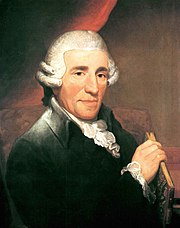Armida (Haydn)
| Armida | |
|---|---|
| Opera by Joseph Haydn | |

Portrait of the composer by Thomas Hardy, in 1791, when Haydn composed the work, his last opera
|
|
| Language | Italian |
| Based on | Torquato Tasso's Gerusalemme liberata |
| Premiere | 26 February 1784 Esterháza court theatre |
Armida, Hob. XXVIII/12, is an opera in three acts by Joseph Haydn, set to a libretto based upon Torquato Tasso's poem Gerusalemme liberata (Jerusalem Delivered). The first performance was 26 February 1784 and it went on to receive 54 performances from 1784 to 1788 at the Esterháza Court Theatre. During the composer's lifetime it was also performed in Pressburg, Budapest, Turin and Vienna. Haydn himself regarded Armida as his finest opera.Armida then disappeared from the general operatic repertoire; it was revived in 1968 in a concert rendition in Cologne, and later a production in Bern. The United States premiere of the opera was given at the Palace Theatre in Manchester, New Hampshire, with the New Hampshire Symphony Orchestra for the Monadnock Music Festival in September 1981. Sarah Reese sang the title role; the director Peter Sellars set the production during the Vietnam War.
Karl Geiringer has commented on how Haydn adopted the "principles and methods" of Christoph Willibald Gluck in this opera, and how the opera's overture alone encapsulates the opera's plot in purely instrumental terms. Haydn's opera contains occasional echoes of Sarti's Giulio Sabino, played at Esterháza in 1783.
The work is scored for flute, two oboes, two clarinets, two bassoons, two horns/trumpets, timpani, strings, continuo.
To prevent the capture of Jerusalem by the knights of the First Crusade, The Prince of Darkness has sent the enchantress Armida into the world to seduce the Christian heroes and turn them from their duty. The bravest of these, Rinaldo, has fallen under Armida's spell. She comes to love him so deeply that she cannot bring herself to destroy him.
...
Wikipedia
